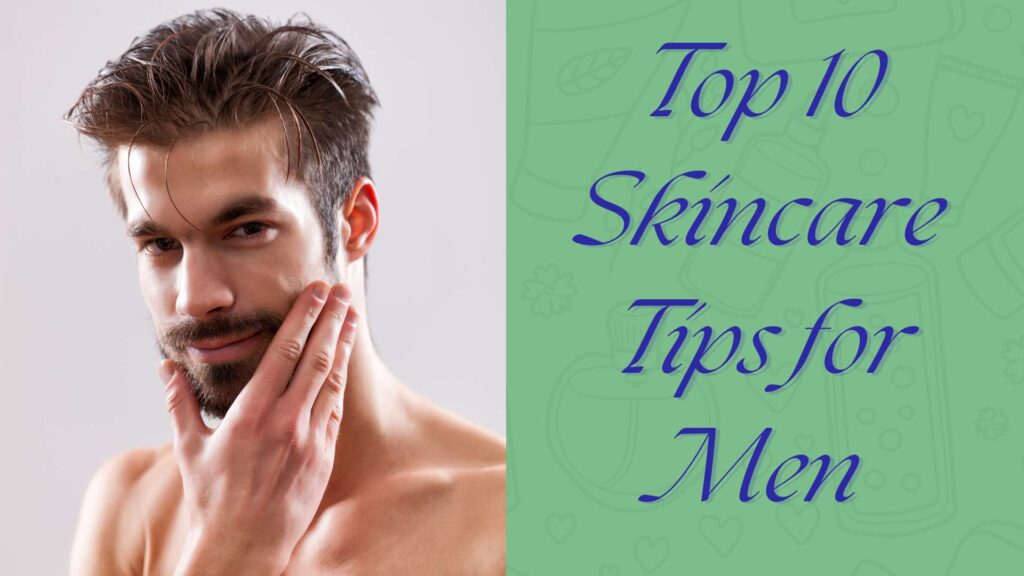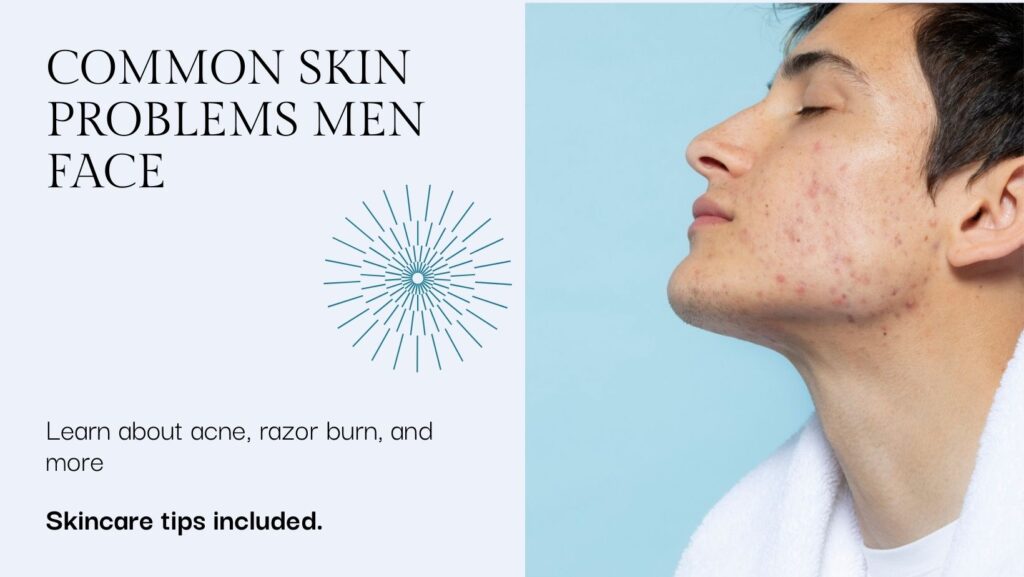In recent years, the importance of skincare has grown significantly, and it’s not just for women. Men are becoming more aware of the need to maintain healthy, youthful skin. This blog post will delve into the Top 10 Skincare Tips for Men, providing practical advice to help you look your best. From cleansing and moisturizing to sun protection and diet, these tips are designed to address common skin concerns and promote overall skin health.
Table of Contents
1. Cleanse Your Face Daily
Cleansing is the foundation of any skincare routine. Men’s skin tends to produce more oil than women’s, making daily cleansing essential to remove dirt, oil, and impurities.
Why Cleansing is Crucial
Daily cleansing helps prevent clogged pores, acne, and other skin issues. Choose a cleanser suited to your skin type—gel cleansers for oily skin, cream cleansers for dry skin, and gentle cleansers for sensitive skin.
How to Cleanse Properly
- Use lukewarm water: Boiling water can strip your skin of regular oils.
- Massage gently: Apply the cleanser with gentle, circular motions to avoid irritating the skin.
- Rinse thoroughly: Ensure no residue is left on the skin.
2. Exfoliate Regularly
Shedding is critical to eliminating dead skin cells and advancing cell turnover. It helps prevent ingrown hairs, which is particularly beneficial for men who shave regularly.
Types of Exfoliants
- Physical exfoliants: Scrubs with small particles to manually remove dead skin.
- Chemical exfoliants: Products with acids like glycolic or salicylic acid to dissolve dead skin cells.
Frequency of Exfoliation
Peel 2-3 times each week, contingent upon your skin type. Over-exfoliating can lead to irritation and dryness.
3. Moisturize Daily
Moisturising is essential for keeping your skin hydrated and balanced. Indeed, even sleek skin needs dampness to forestall overproduction of oil.
Choosing the Right Moisturiser
- For oily skin: Use a lightweight, oil-free moisturiser.
- For dry skin: Decide on a more extravagant, really hydrating equation.
- For sensitive skin: Look for fragrance-free and hypoallergenic products.
When to Moisturise
Apply moisturizer immediately after cleansing and shaving to lock in moisture.
4. Protect Your Skin from the Sun
Sun protection is a crucial aspect of skincare that is often overlooked by men. UV beams can cause untimely maturing, sun related burn, and increment the gamble of skin malignant growth.
Benefits of Sunscreen
- Prevents sunburn and sun damage.
- Reduces the risk of skin cancer.
- Helps prevent premature ageing, such as wrinkles and age spots.
How to Use Sunscreen
- Choose SPF 30 or higher: Ensure broad-spectrum protection against UVA and UVB rays.
- Apply generously: Cover all exposed skin, including the face, neck, and ears.
- Reapply regularly: Especially after sweating or swimming.
5. Shave Smartly
Shaving is a typical reason for bothering and ingrown hairs for men. Following proper shaving techniques can help prevent these issues.
Pre-Shave Preparation
- Soften your beard: Use warm water or a warm towel to soften the hair and open pores.
- Use a quality shaving cream or gel: This helps reduce friction and irritation.
Shaving Technique
- Use a sharp razor: Replace blades regularly to avoid dullness.
- Shave in the direction of hair growth: This helps prevent ingrown hairs and razor burn.
- Rinse with cold water: This closes pores and soothes the skin.
6. Stay Hydrated
Hydration is vital for overall skin health. Drinking plenty of water keeps your skin hydrated from within, which can improve its texture and appearance.
Benefits of Hydration
- Promotes a clear complexion.
- Decreases the presence of scarce differences and kinks
- Helps flush out toxins.
Tips for Staying Hydrated
- Drink at least 8 glasses of water a day.
- Eat water-rich foods: Such as fruits and vegetables.
- Limit dehydrating beverages: Like alcohol and caffeine.
7. Maintain a Healthy Diet
What you eat can significantly impact your skin. A balanced diet rich in vitamins and minerals promotes healthy, glowing skin.
Skin-Boosting Nutrients
- L-ascorbic acid: Assists with collagen creation and skin fix.
- Vitamin E: Provides antioxidant protection and hydration.
- Omega-3 fatty acids: Found in fish and flaxseeds, they help maintain the skin’s barrier.
Foods to Include
- Fruits and vegetables: High in vitamins and antioxidants.
- Lean proteins: Essential for skin repair and renewal.
- Whole grains: Provide necessary nutrients and promote healthy digestion.
8. Get Enough Sleep
Sufficient rest is critical for skin recovery and fix. Absence of rest can prompt dull skin, dark circles, and an in general tired appearance.
Benefits of Good Sleep
- Enhances skin repair and cell turnover.
- Reduces puffiness and dark circles.
- Promotes a healthy complexion.
Tips for Better Sleep
- Maintain a regular sleep schedule.
- Create a relaxing bedtime routine: Avoid screens and stress before bed.
- Ensure your sleeping environment is comfortable: A cool, dark, and quiet room is ideal.
9. Manage Stress
Stress can unleash devastation on your skin, prompting issues like skin break out, dermatitis, and psoriasis. Finding ways to manage stress is essential for maintaining healthy skin.
Effects of Stress on Skin
- Increases oil production, leading to acne.
- Triggers inflammation, exacerbating skin conditions.
- Slows down the skin’s healing process.
Stress-Relief Techniques
- Exercise regularly: Physical activity helps reduce stress.
- Practice mindfulness and meditation: Helps calm the mind.
- Participate in leisure activities: Exercises you appreciate can give a psychological break.
10. Avoid Smoking and Excessive Alcohol
Smoking and unreasonable liquor utilisation can unfavourably affect your skin. They can accelerate ageing and cause various skin problems.
Impact of Smoking
- Reduces blood flow: Leading to dull, uneven skin tone.
- Damages collagen and elastin: Causing premature wrinkles and sagging skin.
- Increases the risk of skin cancer: Particularly on the lips and face.
Impact of Excessive Alcohol
- Dehydrates the skin: Leading to dryness and irritation.
- Causes inflammation: Can exacerbate conditions like rosacea and acne.
- Disrupts sleep: Leading to poor skin repair and regeneration.
Tips to Reduce Smoking and Alcohol Consumption
- Seek support: Join programs or support groups to quit smoking.
- Limit alcohol intake: Stick to moderate drinking guidelines.
- Find healthier alternatives: Replace smoking and drinking with healthier habits.
Conclusion
Incorporating these Top 10 Skincare Tips for Men into your daily routine can significantly improve your skin’s health and appearance. From cleansing and moisturising to protecting your skin from the sun and maintaining a healthy lifestyle, these tips cover all the essential aspects of skincare. Remember, consistency is key. Stick to your skincare routine, and you’ll see noticeable improvements over time. Your skin is an important part of your overall well-being, so take the time to care for it properly.
FAQ: Top 10 Skincare Tips for Men
1. Why is it important for men to have a skincare routine?
Ans: Men’s skin tends to be oilier and thicker than women’s skin, making it prone to different types of issues like acne, ingrown hairs, and premature ageing. A proper skincare routine helps maintain healthy skin, prevents common skin problems, and promotes a more youthful appearance.
2. How often should I cleanse my face?
Ans: You should cleanse your face twice a day, once in the morning and once at night, to remove dirt, oil, and impurities. This is particularly significant assuming you have sleek or skin inflammation inclined skin.
3. What type of moisturiser should I use?
Ans: The sort of lotion you use relies upon your skin type:
Oily Skin: Use a lightweight, oil-free moisturiser.
Dry Skin: Select a more extravagant, hydrating equation.
Sensitive Skin: Choose a fragrance-free, hypoallergenic moisturiser.
4. Do I need to use sunscreen every day?
Ans: Yes, using sunscreen daily is crucial, even on cloudy days or when you’re indoors. UV beams can enter windows and mists, causing skin harm. Pick an expansive range sunscreen with a SPF of 30 or higher.
5. How often should I exfoliate?
Ans: Peel 2-3 times each week to eliminate dead skin cells and forestall obstructed pores. Over-exfoliating can irritate the skin, so adjust the frequency based on your skin’s tolerance.
6. What are the advantages of utilising a toner?
Ans: Toners help remove any remaining impurities after cleansing, balance the skin’s pH, and prepare the skin for moisturising. They can be especially beneficial for oily or acne-prone skin.
7. Can I use the same skincare products as my partner?
Ans: Men’s and women’s skin care needs can differ, but many products are suitable for both. Focus on products tailored to your specific skin type and concerns. In the event that you feel somewhat uncertain, talk with a dermatologist.
8. What should I do about razor bumps and ingrown hairs?
Ans: To prevent razor bumps and ingrown hairs:
1. Shave after a warm shower to soften the hair.
2. Use a sharp razor and a good shaving cream or gel.
3. Shave after a warm shower to mellow the hair.
4. Exfoliate regularly to keep pores clear.
9. How can I manage oily skin?
Ans: For oily skin:
1. Use a gentle cleanser twice a day.
2. Apply a lightweight, oil-free moisturizer.
3. Use oil-control products like mattifying toners or serums.
4. Avoid harsh products that strip your skin of natural oils, which can cause it to produce more oil.
10. Is it necessary to use eye cream?
Ans: The skin around the eyes is delicate and can show signs of ageing and fatigue more quickly. Using an eye cream can help address dark circles, puffiness, and fine lines. Search for items with fixings like caffeine, hyaluronic corrosive, and peptides.
11. How does diet affect my skin?
Ans: A reasonable eating regimen plentiful in nutrients and minerals advances sound skin. Food varieties high in cancer prevention agents, nutrients C and E, and omega-3 unsaturated fats can further develop skin wellbeing. Staying hydrated by drinking plenty of water also helps maintain a clear complexion.
12. What lifestyle changes can improve my skin?
Ans: Get enough sleep: Aim for 7-9 hours per night to allow your skin to repair and regenerate.
Manage stress: Practise relaxation techniques like meditation or exercise to reduce stress-related skin issues.
Avoid smoking and excessive alcohol: These can cause premature ageing and other skin problems.
13. When should I see a dermatologist?
Ans: Consult a dermatologist if you have persistent skin issues, such as severe acne, eczema, psoriasis, or unexplained skin changes. They can provide professional advice and treatment options tailored to your needs.
14. Are natural or organic skincare products better?
Ans: Natural and organic products can be beneficial, but effectiveness depends on the ingredients and your skin type. Always check the product labels and perform patch tests to ensure they suit your skin without causing irritation.
15. Can I use face masks, and how often?
Ans: Face masks can provide additional benefits like deep cleansing, hydration, or soothing. Use them 1-2 times each week based on your skin’s necessities. Choose masks with ingredients that target your specific concerns.
16. How do I know my skin type?
Ans: To decide your skin type, see how your skin acts over the course of the day:
Sleek Skin: Sparkly and oily, particularly in the T-zone (brow, nose, and jaw).
Dry Skin: Tight, flaky, and rough.
Combination Skin: Oily in the T-zone and dry or normal on the cheeks.
Sensitive Skin: Prone to redness, irritation, and reactions to products.
Normal Skin: Balanced, not too oily or dry, and few blemishes.
By following these top skincare tips and addressing common concerns, men can achieve healthier, more vibrant skin. If you have additional questions or need personalized advice, don’t hesitate to reach out to a skincare professional.



